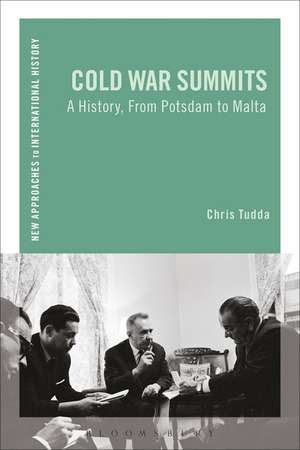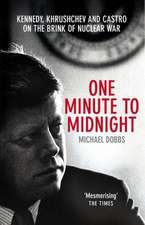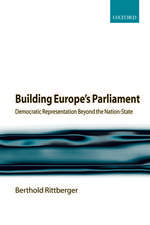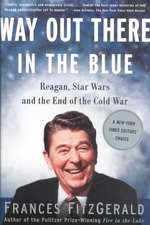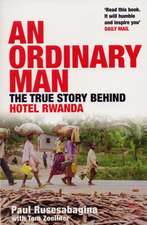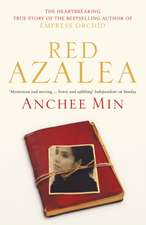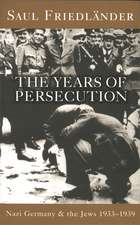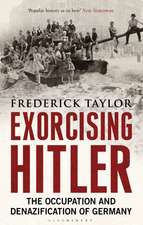Cold War Summits: A History, From Potsdam to Malta: New Approaches to International History
Autor Chris Tuddaen Limba Engleză Paperback – 21 oct 2015
| Toate formatele și edițiile | Preț | Express |
|---|---|---|
| Paperback (1) | 144.84 lei 3-5 săpt. | +15.95 lei 4-10 zile |
| Bloomsbury Publishing – 21 oct 2015 | 144.84 lei 3-5 săpt. | +15.95 lei 4-10 zile |
| Hardback (1) | 497.89 lei 6-8 săpt. | |
| Bloomsbury Publishing – 21 oct 2015 | 497.89 lei 6-8 săpt. |
Din seria New Approaches to International History
- 19%
 Preț: 168.15 lei
Preț: 168.15 lei - 8%
 Preț: 154.50 lei
Preț: 154.50 lei -
 Preț: 160.19 lei
Preț: 160.19 lei - 7%
 Preț: 134.66 lei
Preț: 134.66 lei - 7%
 Preț: 149.02 lei
Preț: 149.02 lei - 17%
 Preț: 177.88 lei
Preț: 177.88 lei - 7%
 Preț: 148.75 lei
Preț: 148.75 lei - 8%
 Preț: 153.45 lei
Preț: 153.45 lei - 14%
 Preț: 165.91 lei
Preț: 165.91 lei - 13%
 Preț: 167.24 lei
Preț: 167.24 lei - 13%
 Preț: 180.88 lei
Preț: 180.88 lei - 14%
 Preț: 186.19 lei
Preț: 186.19 lei - 13%
 Preț: 176.74 lei
Preț: 176.74 lei - 14%
 Preț: 147.24 lei
Preț: 147.24 lei - 23%
 Preț: 192.36 lei
Preț: 192.36 lei - 7%
 Preț: 149.02 lei
Preț: 149.02 lei - 7%
 Preț: 148.29 lei
Preț: 148.29 lei - 21%
 Preț: 217.91 lei
Preț: 217.91 lei - 20%
 Preț: 219.46 lei
Preț: 219.46 lei - 13%
 Preț: 180.88 lei
Preț: 180.88 lei - 23%
 Preț: 192.30 lei
Preț: 192.30 lei - 30%
 Preț: 571.01 lei
Preț: 571.01 lei - 14%
 Preț: 539.25 lei
Preț: 539.25 lei - 23%
 Preț: 191.75 lei
Preț: 191.75 lei - 22%
 Preț: 227.23 lei
Preț: 227.23 lei - 13%
 Preț: 201.34 lei
Preț: 201.34 lei - 30%
 Preț: 510.68 lei
Preț: 510.68 lei - 13%
 Preț: 175.85 lei
Preț: 175.85 lei - 22%
 Preț: 656.47 lei
Preț: 656.47 lei
Preț: 144.84 lei
Nou
Puncte Express: 217
Preț estimativ în valută:
27.72€ • 30.12$ • 23.30£
27.72€ • 30.12$ • 23.30£
Carte disponibilă
Livrare economică 31 martie-14 aprilie
Livrare express 14-20 martie pentru 25.94 lei
Preluare comenzi: 021 569.72.76
Specificații
ISBN-13: 9781472529589
ISBN-10: 1472529588
Pagini: 240
Dimensiuni: 156 x 234 x 13 mm
Greutate: 0.36 kg
Editura: Bloomsbury Publishing
Colecția Bloomsbury Academic
Seria New Approaches to International History
Locul publicării:London, United Kingdom
ISBN-10: 1472529588
Pagini: 240
Dimensiuni: 156 x 234 x 13 mm
Greutate: 0.36 kg
Editura: Bloomsbury Publishing
Colecția Bloomsbury Academic
Seria New Approaches to International History
Locul publicării:London, United Kingdom
Caracteristici
Covers the entire duration of the Cold War and is ideal for international history courses
Notă biografică
Chris Tudda is a historian in the Department of State and Adjunct Professor at The George Washington University, USA.
Cuprins
1. Introduction2. Potsdam: How the Cold War Began3. Bandung: The Former Colonies Declare their Independence (Again)4. Glassboro: The Beginning of Detente5. Beijing: Sino-U.S. Rapprochement and the Cold War6. Vienna: Carter, Brezhnev, and Détente's Last Breath7. Malta: Ending the Cold War8. ConclusionBibliographyIndex
Recenzii
Tudda (history, George Washington Univ.) has produced a book destined to become the benchmark work on the Cold War-era summits. Because of the book's excellent format, it is one of those rare historical works that will be accessible to beginning students, yet also of interest to experts in the field. Tudda covers all of the summits between 1945 and 1991 (Potsdam, Bandung, Glassboro, Beijing, Vienna, and Malta). Each chapter begins by setting the historical stage for the summit, enabling novices to better understand the issues and era in which the summit took place. Taken as a whole, these background pages form a history of cold war issues and relations between the Soviet Union and US, almost constituting a book within the book. Following the background information, Tudda provides detailed descriptions of the summit discussions between US presidents and Soviet premiers or other leaders. In addition to the US-Soviet summits, there are detailed descriptions of the Bandung Summit, which involved Asian and African leaders, as well as the Beijing Summit meetings that involved President Nixon and Mao Zedong. Tudda notes throughout the importance of summitry during the nuclear age, when building relationships between US and Soviet leaders helped reduce the danger of nuclear war. Summing Up: Essential. All academic levels/libraries.
Aimed at providing 'an introduction for researchers new to a topic ... and essential reading in classrooms' (p. viii) this book does just that, and does it well.
Cold War summit diplomacy did matter and was mandatory for the survival of the planet due to the advent of the nuclear arms race. Chris Tudda's book meticulously recounts the conversations of world leaders and carefully contextualizes and analyzes six summits -- surprisingly including the meeting of Third World leaders at Bandung in 1955. The result is a compelling narrative demonstrating the power of personal diplomacy in taming Cold War conflicts.
A useful survey of some of the neglected summit conferences of the Cold War and of their place in history, based on official documents.
Chris Tudda's Cold War Summits is more than tales from high-level talks. It is a history of the Cold War told through the key moments when leaders of extraordinary influence and power came together to solve, or at least to discuss, the great issues of their day. These were conversations that mattered, personalities that mattered, and ultimately, moments that helped the nuclear-tinged Cold War ultimately end without the bang the world feared. Well written, well researched, and insightful throughout, Tudda's Cold War Summits belongs on every international historian's shelf.
Aimed at providing 'an introduction for researchers new to a topic ... and essential reading in classrooms' (p. viii) this book does just that, and does it well.
Cold War summit diplomacy did matter and was mandatory for the survival of the planet due to the advent of the nuclear arms race. Chris Tudda's book meticulously recounts the conversations of world leaders and carefully contextualizes and analyzes six summits -- surprisingly including the meeting of Third World leaders at Bandung in 1955. The result is a compelling narrative demonstrating the power of personal diplomacy in taming Cold War conflicts.
A useful survey of some of the neglected summit conferences of the Cold War and of their place in history, based on official documents.
Chris Tudda's Cold War Summits is more than tales from high-level talks. It is a history of the Cold War told through the key moments when leaders of extraordinary influence and power came together to solve, or at least to discuss, the great issues of their day. These were conversations that mattered, personalities that mattered, and ultimately, moments that helped the nuclear-tinged Cold War ultimately end without the bang the world feared. Well written, well researched, and insightful throughout, Tudda's Cold War Summits belongs on every international historian's shelf.
